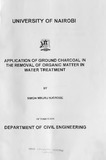| dc.contributor.author | Njoroge, Simon M | |
| dc.date.accessioned | 2013-05-06T13:43:51Z | |
| dc.date.available | 2013-05-06T13:43:51Z | |
| dc.date.issued | 2001 | |
| dc.identifier.uri | http://erepository.uonbi.ac.ke:8080/xmlui/handle/123456789/19434 | |
| dc.description.abstract | The organic matter in water has potential to cause serious effects on human health
due to the formation of carcinogenic trlhalornethanes with chemical disinfectants
such as chlorine. The organic matter in water may be removed by filtration
(straining) and adsorption. Granular activated carbon is best known in the removal
of organic material by adsorption However, its availability is limited by its nature of
production and cost. On the other hand, wood charcoal is common and easy to
produce. Investigation on use of ground wood charcoal in tile removal of organic
matter in water when used as a filter media in water treatment process is presented
Black wattle tree charcoal, produced by the carbonisation process and containing
76.5% carbon content was used in this investigation as filter media in comparison to
the sand used in rapid sand filters in terms of organic matter removal by chemical
oxygen demand (COD), turbidity removal and head loss development from water
that had been sampled from the upper reaches of the Nairobi River.
The filtration tests were carried out at 2m3/m2/hr and showed better performance by
ground charcoal than sand both in terms of COD and turbidity removal. The
charcoal exhibited higher turbidity removal of between 40-52% in high turbidity
waters and 40-65(Yo in low turbidity waters whereas the sand exhibited 38-49% and
25-56% turbidity removals in the respective waters The rem?val rates were better
than sand by 1.2-2.0 times. Head loss development was more pronounced in sand
than in charcoal and the rate was more by b~tween 1.2 and 2 times. COD removal
was between 56-100% for ground charcoal and the rate of removal was better than
sand by 2-3 times.
The results showed that charcoal can replace sand in rapid sand filtration stage of a
water treatment process for waters having turbidity amounts of up to 10 NTU.
Ground charcoal's ability to remove organic material makes it more suitable for
treatment of individual, small community and rural community water supplies where
water contains organic matter, and chlorine is used as a disinfectant | en |
| dc.description.sponsorship | The University of Nairobi | en |
| dc.language.iso | en | en |
| dc.subject | Application of ground charcoal | en |
| dc.subject | organic matter in water treatment | en |
| dc.title | Application of Ground Charcoal in the Removal of Organic Matter in Water Treatment | en |
| dc.type | Thesis | en |
| local.publisher | University of Nairobi, | en |

